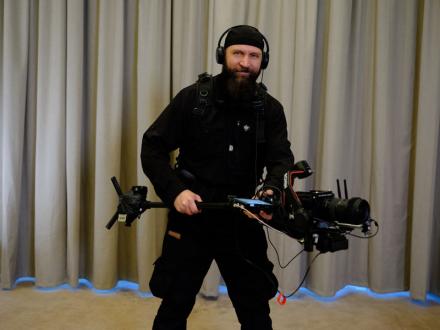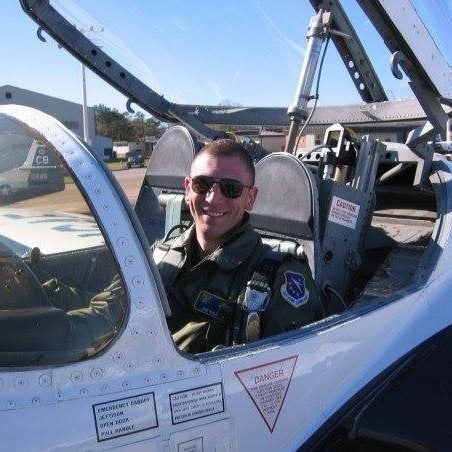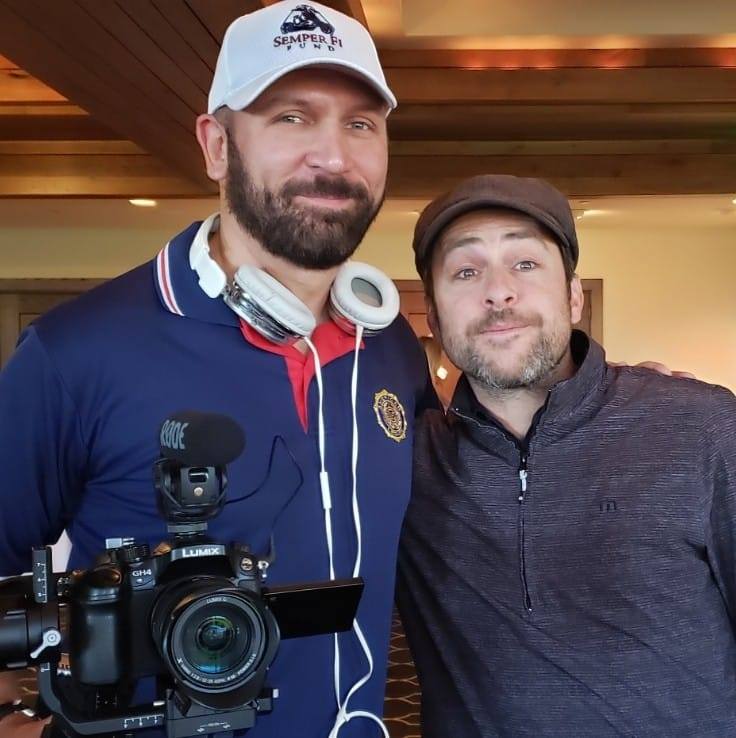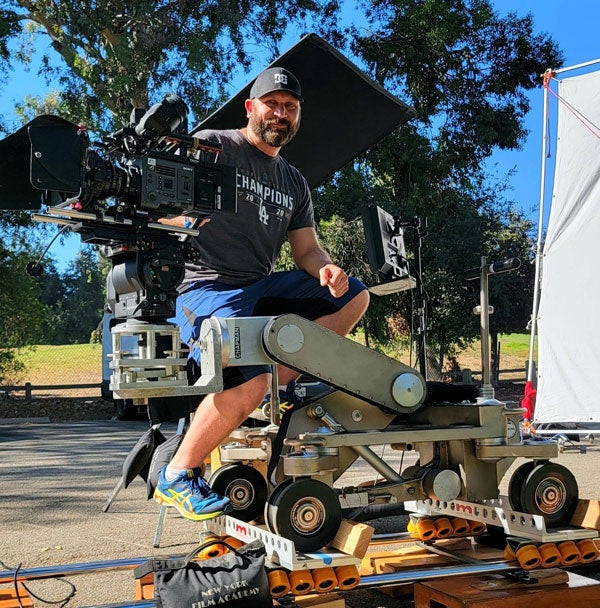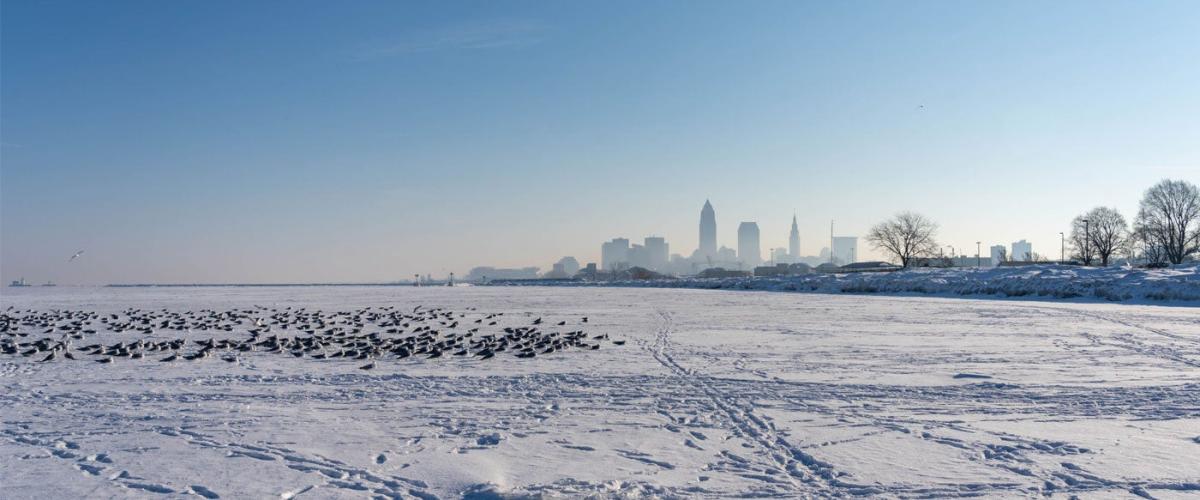Joseph Paul Knable is a master of multiple realms—currently pursuing his fourth graduate degree at the Mandel School, he is also an adept videographer and a medically retired U.S. Air Force officer.
Read on to learn his story.
Answers have been lightly edited for clarity and length.
Class Year: May 2025
Degree Program: MSW On-Campus
Concentration: Mental Health with Children and Adolescents and School Social Work with a Certificate in Trauma-Informed Practice
Hometown: Cleveland, Ohio
Field Education Organization: Cleveland Clinic at Lakewood High School in Lakewood, Ohio
Share your journey and what inspired your diverse academic and professional path.
I'll start towards the beginning with some fun facts about myself:
- I was a child contestant on the TV show, Where in the World is Carmen Sandiego?;
- I was the youngest person to ever attend North Central State College (I was 15 and I made the Dean's List); and
- I was a royalty-published author when I was 21 years old by a national publisher—my book is still available on Amazon.
I always knew I would serve in the military and I decided early on I wanted to be an officer. In 2005, I was commissioned as a second lieutenant in the Air Force when I graduated with my bachelor's degree. I became a private pilot and went to Air Force pilot training but was ultimately medically disqualified from flying. I then planned to do a long career as a public affairs officer, but the same medical problem—two conditions with my internal organs—cut my military career short. I was medically retired as a captain after seven years of active duty, in 2012. With my dream of being a career Air Force officer over, I had to find a new dream.
After studying to be a language arts teacher in undergrad, and doing my student teaching in Australia, I then committed to three years with a program called Troops to Teachers to teach high school English, theater and oral communication in low-income schools in Little Rock, Arkansas. While doing that, I found my new dream: to become a screenwriter and filmmaker. However, I also knew I wanted to be a counselor in some way later on, so I studied pastoral counseling and obtained my first master's degree from Liberty University in 2014.
I then moved to Los Angeles to pursue two additional master's degrees from the New York Film Academy—a Master of Fine Arts (MFA) in Screenwriting (2018) and a MFA in Cinematography (2021), both terminal degrees. I studied under great cinematographers including Tony Richmond (the last person to ever film the Beatles), Suki Mendencevic and David Armstrong. I wanted to become very skilled and well-rounded as a screenwriter and filmmaker.
As a filmmaker and camera operator in LA, I worked with comedian Bill Burr, Breaking Bad creator Vince Gilligan, Charlie Day (pictured with me here), Richard Dreyfus, Logan and Jake Paul, and Lizzo. I also participated in a year-long writing fellowship with the Writers Guild Foundation, called the Veterans Writing Project, and volunteered with the organization the following year. And, I was the videographer and on a leadership team for the 5,000-member Veterans in Media and Entertainment group.
The pandemic challenged my priorities though, and I decided to move back home to Ohio to be with my sisters and parents. I worked as a documentary filmmaker and camera operator for two years, but I wanted a more stable day job. I was heartbroken to learn of the increase in teen suicides during the pandemic, so I decided to become a therapist to help as many young people as possible improve their mental health and to try to prevent teen suicides. I enjoyed working with teenagers as an English and theater teacher, but I wanted to return to the school setting as a therapist in order to spend all my time helping kids. So, I applied to the best social work school in Ohio and began the Mandel School's MSW program last fall to obtain my third terminal degree.
How did your experience in the Air Force influence your decision to enter the world of filmmaking?
The career field of a public affairs officer in the Air Force incorporates many writing and filmmaking skills, including videographers. Working with these professionals piqued my interest in making films in a larger context. I don't tell many military stories the way some veterans do. Rather, I tend to tell stories of people who have experienced heartbreak and setbacks and who find new dreams. Being medically retired and having to start over has inspired several of the screenplays I've written.
How do you envision combining your social work education with your filmmaking background in your future endeavors?
First and foremost, I want to become a skilled therapist to help students. I am currently working as a therapist in my field placement at the Cleveland Clinic at Lakewood High School. I work with adolescents in individual and group therapy, co-lead a depression and anxiety group for high school students, and participate in the Cleveland Clinic's pediatric mental health team.
My field instructor, Ashley Penman, has taught me so much about how to be an effective therapist to adolescents through cognitive behavioral therapy (CBT), dialectical behavior therapy (DBT) and eye movement desensitization and reprocessing (EMDR) practices. I am learning that each client has a unique story and takes a different amount of time to open up and share, so you have to be flexible and meet each person at their need.
I also want to make socially-conscious documentary films as both a filmmaker and a social worker. I want to tell stories that reveal key issues in the community and give voices to the voiceless, informed by my training as a social worker.
How can storytelling through film contribute to social change or address social issues?
We watch documentary films in social work classes to gain insight on social issues, so this is already an important tool for social change and addressing social issues. An effective documentary film can reveal an issue in a powerful and digestible way for a large audience (e.g., films made to explain mental disorders that are misunderstood or that shed light on social problems such as the Flint Water Crisis). After watching an excellent documentary, people can understand issues and situations better and take action.
Tell us about some of your filmmaking projects.
A few projects I am proud of:
- I worked as both a camera operator and second unit director on a powerful documentary about homelessness in LA, titled The Mad Man.
- I am finishing a feature-length documentary I directed, filmed and edited about the 2023 Buckeye Boys State that will be released soon.
- I created a one-minute video about my background for a veterans organization I am a mentor for, Heroes Linked.
- I made short videos for the Cleveland Museum of Art, the Cleveland Reggae Festival and @clevelandvibes, a popular Cleveland social media account.
This is a cinematography reel that shows a sample of all my work. My Instagram page also has more examples—follow me for updates! 🎥


